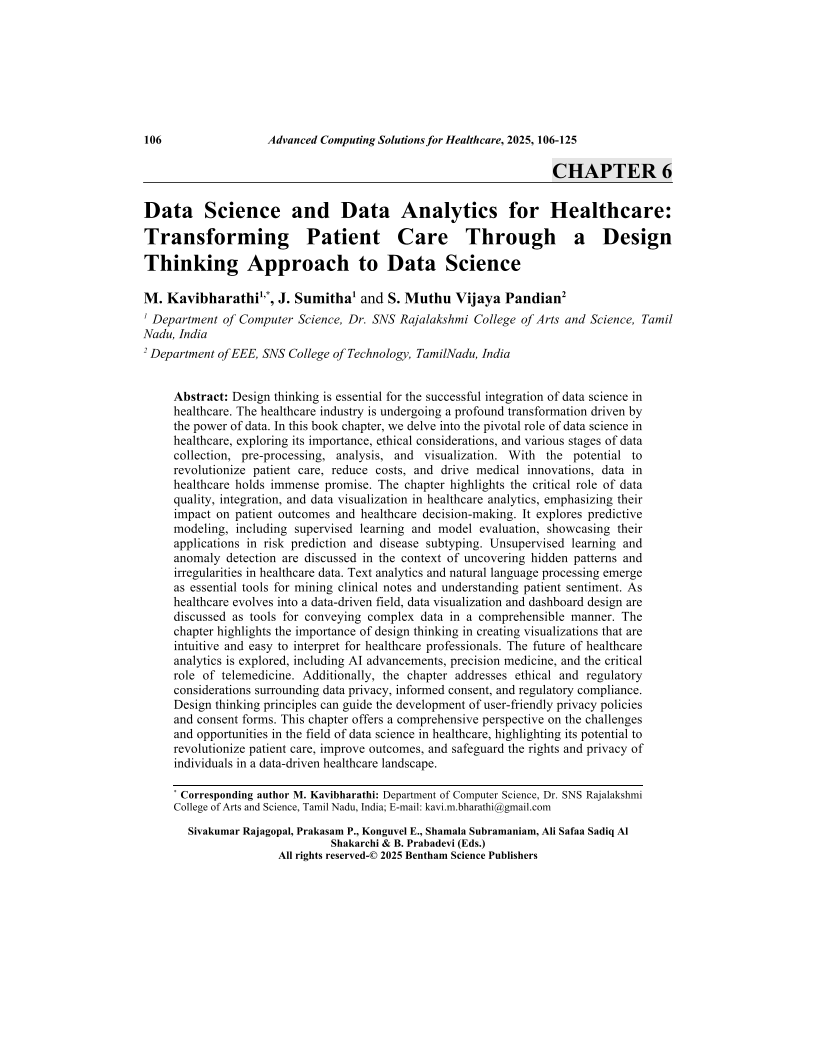Data Science and Data Analytics for Healthcare: Transforming Patient Care Through a Design Thinking Approach to Data Science

- Authors: M. Kavibharathi1, J. Sumitha2, S. Muthu Vijaya Pandian3
-
View Affiliations Hide Affiliations1 Department of Computer Science, Dr. SNS Rajalakshmi College of Arts and Science, c, India 2 Department of Computer Science, Dr. SNS Rajalakshmi College of Arts and Science, Tamil Nadu, India 3 Department of EEE, SNS College of Technology, TamilNadu, India
- Source: Advanced Computing Solutions for Healthcare , pp 106-125
- Publication Date: July 2025
- Language: English
Data Science and Data Analytics for Healthcare: Transforming Patient Care Through a Design Thinking Approach to Data Science, Page 1 of 1
< Previous page | Next page > /docserver/preview/fulltext/9789815274134/chapter-6-1.gif
Design thinking is essential for the successful integration of data science in healthcare. The healthcare industry is undergoing a profound transformation driven by the power of data. In this book chapter, we delve into the pivotal role of data science in healthcare, exploring its importance, ethical considerations, and various stages of data collection, pre-processing, analysis, and visualization. With the potential to revolutionize patient care, reduce costs, and drive medical innovations, data in healthcare holds immense promise. The chapter highlights the critical role of data quality, integration, and data visualization in healthcare analytics, emphasizing their impact on patient outcomes and healthcare decision-making. It explores predictive modeling, including supervised learning and model evaluation, showcasing their applications in risk prediction and disease subtyping. Unsupervised learning and anomaly detection are discussed in the context of uncovering hidden patterns and irregularities in healthcare data. Text analytics and natural language processing emerge as essential tools for mining clinical notes and understanding patient sentiment. As healthcare evolves into a data-driven field, data visualization and dashboard design are discussed as tools for conveying complex data in a comprehensible manner. The chapter highlights the importance of design thinking in creating visualizations that are intuitive and easy to interpret for healthcare professionals. The future of healthcare analytics is explored, including AI advancements, precision medicine, and the critical role of telemedicine. Additionally, the chapter addresses ethical and regulatory considerations surrounding data privacy, informed consent, and regulatory compliance. Design thinking principles can guide the development of user-friendly privacy policies and consent forms. This chapter offers a comprehensive perspective on the challenges and opportunities in the field of data science in healthcare, highlighting its potential to revolutionize patient care, improve outcomes, and safeguard the rights and privacy of individuals in a data-driven healthcare landscape.
-
From This Site
/content/books/9789815274134.chapter-6dcterms_subject,pub_keyword-contentType:Journal -contentType:Figure -contentType:Table -contentType:SupplementaryData105

